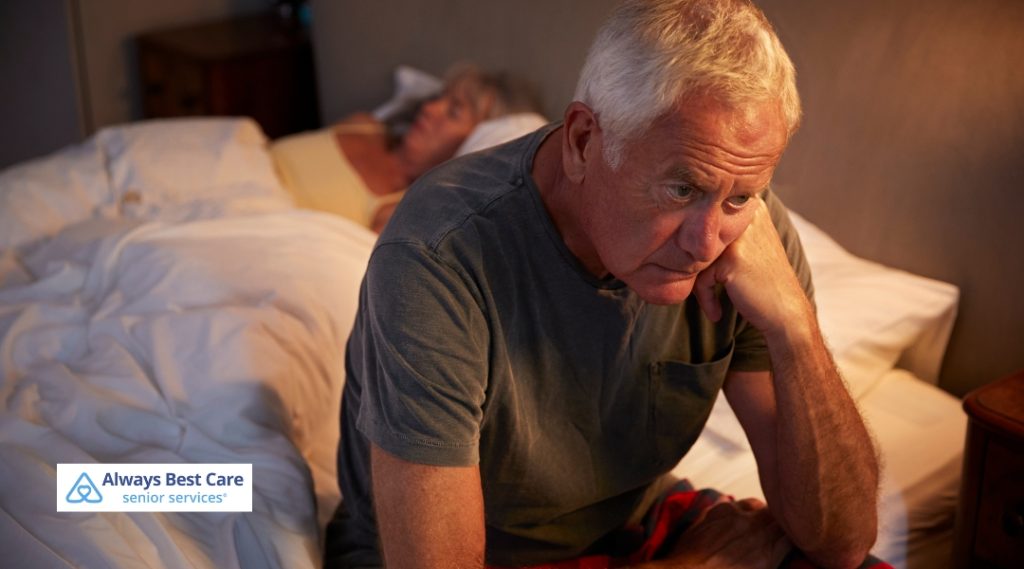Senior Sleep Guide: Tackling Insomnia in Milwaukee for Better Rest

We all know how a lack of sleep can leave us feeling groggy and drained the next day.
For seniors in Milwaukee, it can feel like a constant struggle.
Insomnia isn’t just about being tired; it can affect your mood, energy levels, and overall well-being. As we age, sleep patterns change, and many seniors find it harder to fall or stay asleep.
But don’t worry!
With the right strategies, you can improve your sleep and feel more energized.
Table of Contents
Why Do Old People Sleep So Much
Have you noticed that seniors tend to sleep more during the day?
While it’s true that seniors may sleep longer, it’s often due to fragmented sleep at night.
Seniors may wake up multiple times during the night, which can lead them to nap more during the day.
But here’s the catch: Excessive daytime naps can affect nighttime sleep.
Instead, focus on staying active during the day and keeping a consistent sleep routine.

Why Seniors Experience Insomnia
As we get older, sleep issues are often part of the package.
Many seniors face insomnia due to changes in the body’s internal clock, health conditions like arthritis or sleep apnea, or medications that can interfere with rest. Emotional and mental health challenges, like anxiety or depression, also play a role.
These factors often make it harder to get a full night’s sleep.
How Insomnia Impacts Seniors’ Health and Quality of Life
Not getting enough sleep isn’t just an inconvenience—it can take a toll on your health.
For seniors, chronic insomnia can lead to increased irritability, fatigue, and difficulty concentrating. Over time, lack of sleep can even affect memory and decision-making skills, especially for seniors.
On top of that, poor sleep is linked to other health issues like depression, anxiety, and even heart disease.

4 Tips to Create an Ideal Sleep Environment
- Temperature: A cool room (around 60-67°F) is ideal for sleep. If it’s too hot or too cold, it can disrupt your rest.
- Lighting: Block out outside light with blackout curtains or shades. Too much light can confuse your internal clock and make it harder to fall asleep.
- Noise: Whether it’s traffic or a noisy neighbor, Milwaukee can be bustling. Consider using earplugs or a white noise machine to mask sounds that could keep you awake.
- Comfortable Bedding: Make sure your mattress and pillows provide enough support. If they’re too soft or too hard, it can affect how well you sleep.
Establish a Consistent Sleep Routine
Sticking to a consistent sleep schedule is one of the best ways to improve sleep.
Try to go to bed and wake up at the same time every day—even on weekends. This helps regulate your body’s internal clock, making it easier to fall asleep and wake up feeling refreshed.
In addition to a set schedule, try creating a calming pre-sleep routine. This can be anything from reading a book to listening to calming music or even practicing light stretching before bed.
3 Diet and Exercise Tips to Improve Sleep
What you eat and how active you are during the day plays a significant role in how well you sleep at night. Here’s how to use diet and exercise to your advantage:
- Limit Caffeine and Heavy Meals: Caffeine and large meals can interfere with your ability to fall asleep. Try to avoid them, especially in the afternoon and evening.
- Sleep-Promoting Snacks: Certain foods, like cherries, almonds, and turkey, are known to promote sleep. A light snack before bed, like a handful of almonds, can help your body relax.
- Exercise: Regular physical activity can help you sleep more soundly. Take a walk around your neighborhood, do some light yoga, or even join a local fitness class. Just be sure not to exercise too close to bedtime—it could have the opposite effect.

Managing Stress and Anxiety for Better Sleep
Stress and anxiety are major sleep disruptors for seniors. With so many changes happening in life—health issues, financial concerns, or even social isolation—it’s easy to feel overwhelmed. However, managing stress is crucial for improving sleep.
Try relaxation techniques like deep breathing, meditation, or progressive muscle relaxation to calm your mind before bed. Even something as simple as keeping a journal to jot down your thoughts or worries can help clear your mind and prepare you for sleep.
When to Seek Professional Help for Insomnia
If sleep problems persist despite trying these strategies, it may be time to consult a healthcare provider.
Persistent insomnia could be linked to underlying issues like sleep apnea, depression, or restless leg syndrome, and a healthcare professional can help determine the cause and recommend treatments.
Don’t hesitate to reach out to a doctor if insomnia is affecting your quality of life.

FAQs
1. How much sleep do seniors need?
Seniors generally need 7-9 hours of sleep per night, though individual needs can vary.
2. What are the best foods to help with sleep?
Foods rich in tryptophan, like turkey, and foods high in magnesium, like almonds, can help promote sleep.
3. Can exercise help improve sleep?
Yes! Regular physical activity can help you fall asleep faster and enjoy deeper sleep.
Take the First Step Toward Better Sleep Today!
If you or a loved one are struggling with insomnia and need extra support, we are here to help.
Contact Always Best Care of Milwaukee at (262) 439-8616 to schedule a care consultation and learn how our in-home care services can improve your quality of life. A restful night’s sleep is just a call away!





